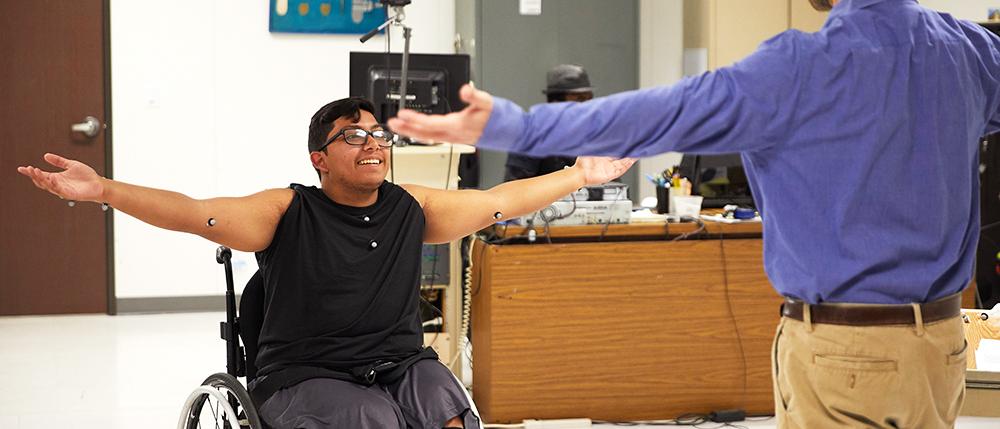
- Toyota Mobility Foundation & Nesta’s Challenge Prize Centre launch a multi-million dollar challenge to expand mobility across the globe for people with lower-limb paralysis
- Mobility Unlimited Challenge will reward development of personal mobility devices incorporating intelligent systems
- Solutions will come from across the technological and design spectrum, from artificial intelligence to exoskeletons
- Challenge supported by international ambassadors from worlds of sport, media, design, art and technology.
Los Angeles, California, USA (November 16, 2017) - The Toyota Mobility Foundation, in partnership with Nesta’s Challenge Prize Centre, has launched a $4 million dollar global challenge to change the lives of people with lower-limb paralysis, culminating in the unveiling of the winners in Tokyo in 2020.
The Mobility Unlimited Challenge is seeking teams around the world to create game-changing technology that will help radically improve the mobility and independence of people with paralysis.
The Mobility Unlimited Challenge aims to harness creative thinking from across the world to accelerate innovation and encourage collaboration with users to find winning devices to transform the world for people with lower-limb paralysis. The Challenge will reward the development of personal mobility devices incorporating intelligent systems.
“Challenges bring out the best in the human spirit and mind, says US athlete Tatyana McFadden. “Our potential cannot be held back. I’m supporting the Mobility Unlimited Challenge because I believe that the creative problem-solving it encourages could bring about real change for the better, not just for people with paralysis, but for everyone. “
“This is about teams. Not just teams of inventors (who also may or may not be disabled). But the wider team: people with lower-limb paralysis who will crowdsource the solutions they want to see.
“I’m proud to be part of this journey and cannot wait to see the winning device unveiled in Tokyo in 2020”.
Around the world, millions of people have lower-limb paralysis (the most common causes being strokes, spinal cord injury and multiple sclerosis). While there are no statistics on paralysis worldwide, the World Health Organization estimates there are 250,000-500,000 new cases of spinal cord injury globally every year.
Innovation in “smarter” mobility technology has the potential to create personal devices that are better integrated with the user’s body and the environment. But the application of this groundbreaking technology is slow due to disincentives such as small and fragmented markets, regulatory burdens, and reimbursement complexities from healthcare systems and insurers.
The mobility solutions of the future could include anything from exoskeletons, to artificial intelligence and machine learning, from cloud computing to batteries.
The Mobility Unlimited Challenge Prize is supported by a number of ambassadors from around the world, all of whom have experience of living with lower-limb paralysis. Global ambassadors include: Aki Taguchi, Director, Paralympian Association of Japan; August de los Reyes, Head of Design at Pinterest; Indian athlete and campaigner Preethi Srinivasan; Dr Rory A Cooper, director of the Human Engineering Research Laboratories at the University of Pittsburgh; Sandra Khumalo, South African rower; Sophie Morgan, British TV presenter; US track & field athlete Tatyana McFadden; and Yinka Shonibare MBE, Turner-Prize nominated British/Nigerian artist. (All global ambassadors are available for interview on request).
“This is the beginning of our challenge, a three-year journey concluding in Tokyo in 2020”, Ryan Klem, Director of Programs for Toyota Mobility Foundation, commented. “A journey where the greatest minds in technology, design and engineering, from every corner of the world, will compete to make the environment and society more accessible for people with lower-limb paralysis. We know we don’t have solutions yet: this Challenge is about working with the people who can help develop them.”
“Challenge Prizes are a way to make innovation happen” says Charlotte Macken of Nesta’s Challenge Prize Centre, explained. “The Mobility Unlimited Challenge is about the freedom to move. It will support innovators, creating cutting-edge personal mobility devices incorporating smart technology and intelligent systems that will transform people’s lives."
A panel of expert judges will pick five finalists who will each receive $500,000 to take their concepts from an intelligent insight to a prototype. The Challenge winner will receive $1,000,000 to make the device available to users- with the winning concept unveiled in Tokyo in 2020.
The Mobility Unlimited Challenge aims to attract and support smaller innovators who might otherwise struggle to break into the assistive technology market. The Discovery Awards will provide seed funding of $50,000 for 10 groups with promising concepts, but who might otherwise lack the resources to enter the Challenge. Interested innovators can apply online at mobilityunlimited.org.
At the end of the Mobility Unlimited Challenge, the Toyota Mobility Foundation and Nesta’s Challenge Prize Centre will have supported teams of innovators in creating leading edge technological solutions, opening a new chapter in personal mobility for people with lower-limb paralysis.

